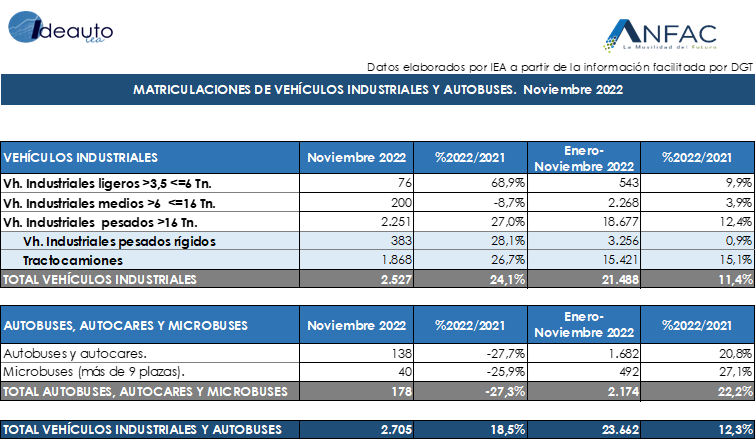Sales of passenger cars and SUVs reached 73,221 units in the month, but there is still a decrease of 4.4% in the total for the year.
Registrations of light commercial vehicles fell 3% in the month, with 10,159 sales.
Sales of industrial vehicles, buses, coaches and minibuses increased by 18.5% in November with 2,705 units.
Madrid, December 1, 2022. Sales of passenger cars and SUVs closed positive in November, with growth of 10.3%, with 73,221 units. The national market chains its fourth month of increase, but despite this trend it is still below the records of the previous year, accumulating a drop of 4.4% to 739,469 new registrations and likewise it is 36% lower than the same 2019 period before the pandemic. Economic uncertainty, marked by rising inflation and the microchip crisis, which affects the stock of models at dealerships, continue to be the main factors determining the rate of sales.
The average CO2 emissions of passenger cars sold in November remain at 120.4 grams of CO2 per kilometer traveled, 0.3% higher than the average emissions of new passenger cars sold in the same month of 2021. In the accumulated of the year, emissions have decreased by 3.3% compared to the same cumulative period of the previous year.
Regarding the registrations by channels, they achieve a general improvement in line with the market. The greatest increase was registered in the rental channel, which obtained a growth of 79.7% and a total of 5,804 units, since it is making purchases for the Christmas campaign. For their part, sales to companies reached 31,641 units, with a rise of 10.1%. While registrations in the private channel achieved a moderate growth of 3.9%, with a volume of 35,776 units.

LIGHT COMMERCIAL VEHICLES
In November, the registrations of light commercial vehicles accumulated a total of 10,159 units, which represents a decrease of 3% compared to last year. In the accumulated of the year there are a total of 107,322 sales, which represent a decrease of 23.9% compared to the previous year. By channels, only sales to companies managed to grow, with an increase of 13.7% and 7,490 units sold. For their part, both the self-employed and the renter suffered a decrease this month, with a decrease of 21.2% and 44.2%, respectively.


INDUSTRIAL AND BUSES
The registrations of industrial vehicles, buses, coaches and minibuses in November closed another positive month, with an increase in sales of 18.5% and a total of 2,705 registered units. For the accumulated of the year, they are located in a total market of 23,662 new registrations, which represents an increase of 12.3%. By type of vehicle, industrial vehicles registered 2,527 units, with a growth of 24.1% in the month, while sales of buses, coaches and minibuses closed November with a decrease of 27.3% and 178 registrations.

STATEMENTS
Félix García, ANFAC’s director of communication and marketing, explained that “sales of passenger cars and SUVs have chained their fourth month of growth, closing November with an increase of 10.2%. This is positive data and indicates that the year may end with around 820,000 new units sold. In any case, we will still be below the 2021 data and far from the pre-pandemic records obtained, above one million units sold. The microchip crisis and the high inflation that we are experiencing in recent months are, despite the growth of the last four months, factors that determine the pace of a national market that is declining and that needs to continue making the necessary progress towards the low and zero emission vehicles. It is the only way to reduce the high age of the park and thus eliminate vehicles over 15 years old for new ones that contribute to decarbonization and are safer”.
Raúl Morales, communication director of FACONAUTO, indicated that “the vehicle registration data for November confirms the worst scenario for the end of this year, which will hopefully be around 820,000 units sold, something that takes us back to the 2008 crisis. It also confirms the diagnosis we have been making: the main problem that has continued to plague the market is the bottlenecks in the supply of vehicles, to which has been added the sharp increase in fuel prices, which has demobilized many sales. In addition, we have been heavily mediated, like most sectors, by a drop in household consumption due to the escalation of inflation, the increase in interest rates and general uncertainty that reduces the intention to purchase a vehicle by households. In the short term, only an improvement in the supply of dealer stocks and a change in the trend in the price of gasoline can begin to alleviate a market that faces 2023 with great uncertainty.”
According to GANVAM’s communication director, Tania Puche, highlighted that “contrary to what we saw years ago, “Black Friday” has practically not been used as a commercial hanger to boost registrations in the month of November. This is because the distribution networks are not in a position to play the trick of discounts at a time when the lack of stock and the rise in energy and raw material costs are pushing up the average price of vehicles. In this context, the weakness of private purchases continues to be the keynote of the market, which will push us to close the year with a lower volume even than that of 2021, chaining three years below minimums”.
